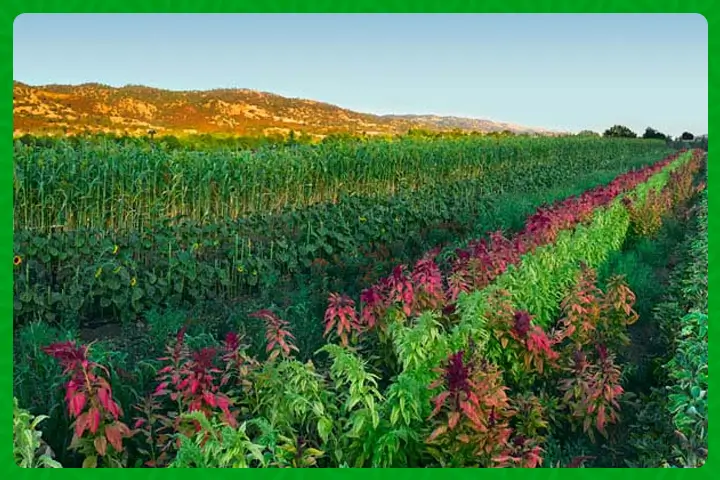
Agriculture, the backbone of human sustenance, has come a long way since the days of subsistence farming. In the relentless pursuit of increased productivity and profitability, the agricultural landscape is witnessing a transformation marked by a fundamental shift—diversification. No longer confined to monoculture, the agricultural paradigm is now embracing diversified farming approaches. This article explores the manifold benefits of diversification in farming, offering a comprehensive look at how this strategy is poised to revolutionize modern agriculture.
1. Enhanced Resilience to Environmental Fluctuations
Picture a vast monoculture field—its uniformity, though visually striking, is a double-edged sword. Monoculture farms, reliant on a single crop, are highly susceptible to environmental fluctuations. A sudden drought or a voracious pest invasion can spell disaster. Diversified farms, however, stand as resilient fortresses. By cultivating a spectrum of crops or raising multiple livestock species, farmers spread their risks. A setback in one area can often be offset by success in another. The result? Reduced vulnerability to catastrophic losses and a more dependable income stream.
2. Improved Soil Health
The relentless cultivation of a single crop over multiple seasons can wreak havoc on soil health. Monoculture depletes nutrients, encourages the buildup of pests and diseases, and can lead to soil erosion. Diversification, with its emphasis on crop rotation and the introduction of complementary plant species, becomes a beacon of hope for weary soils. Varying nutrient demands, pest susceptibility, and root structures invigorate the earth beneath. Healthy soil, teeming with beneficial microorganisms, translates into higher yields and diminished reliance on synthetic inputs.
3. Expanded Market Opportunities
In the realm of diversified farming, the portfolio of crops and livestock resembles a diverse investment portfolio. Different crops cater to various consumer preferences, seasonal demands, and niche markets. Farmers can leverage this diversity to tap into a wider array of markets. A bad season for one crop can be offset by the prosperity of another, ensuring a more stable and resilient income flow. The ability to diversify income sources offers a safety net in an ever-evolving agricultural market.
4. Sustainable Resource Management
Monoculture often demands an extravagant allocation of resources. Heavy irrigation, chemical fertilizers, and pesticides are the norm to maintain yields. Diversification, however, introduces resource efficiency into the equation. Different crops come with varying water requirements, nutrient needs, and pest tolerance levels. This allows for a more sustainable distribution of resources. Reduced environmental impact and lower production costs are the dividends of this judicious resource management.
5. Enhanced Biodiversity
Diversified farms are living ecosystems of biodiversity. They serve as refuges for a plethora of beneficial insects, birds, and soil microorganisms. The vibrant tapestry of life on diversified farms creates a natural defense system against pests and diseases. Farmers find themselves relying less on chemical pest control methods as nature’s balance is restored. This not only reduces costs but also nurtures a healthier, more resilient ecosystem on the farm.
6. Financial Stability
Financial stability is the bedrock of successful farming. Diversification is a key to this stability. A diversified farm is less likely to experience the financial turmoil associated with monoculture. The varied income sources act as a buffer against extreme market fluctuations. This stability facilitates easier access to credit, encourages further investment, and empowers farmers to engage in long-term planning with confidence.
7. Adaptation to Market Trends
In a world where market trends can shift like the wind, diversified farms have a unique advantage. These farms are agile and capable of adapting to changing market dynamics. As consumer preferences veer towards organic or specialty crops, diversified farmers can pivot to meet these demands without the need for a complete overhaul of their operations. Flexibility and adaptability become their allies in navigating the ever-evolving market.
A Path to Agricultural Prosperity
In the face of an unpredictable climate, shifting consumer preferences, and a growing global population, diversification emerges as a pathway to resilience, sustainability, and prosperity in agriculture. By embracing diversity in farming practices, farmers not only secure their livelihoods but also contribute to a more resilient and sustainable global food system. The benefits are profound, and the potential for a prosperous future for farmers is boundless. Diversification is not merely a choice; it’s a strategic imperative for the modern farmer—a path towards agricultural excellence and prosperity.
Stay updated with the latest farming tips and agriculture industry news from Africa by subscribing to our newsletter. Don’t miss out on valuable insights and updates. Follow us on Twitter, LinkedIn, and Facebook to join our farming community and stay connected with us.



















